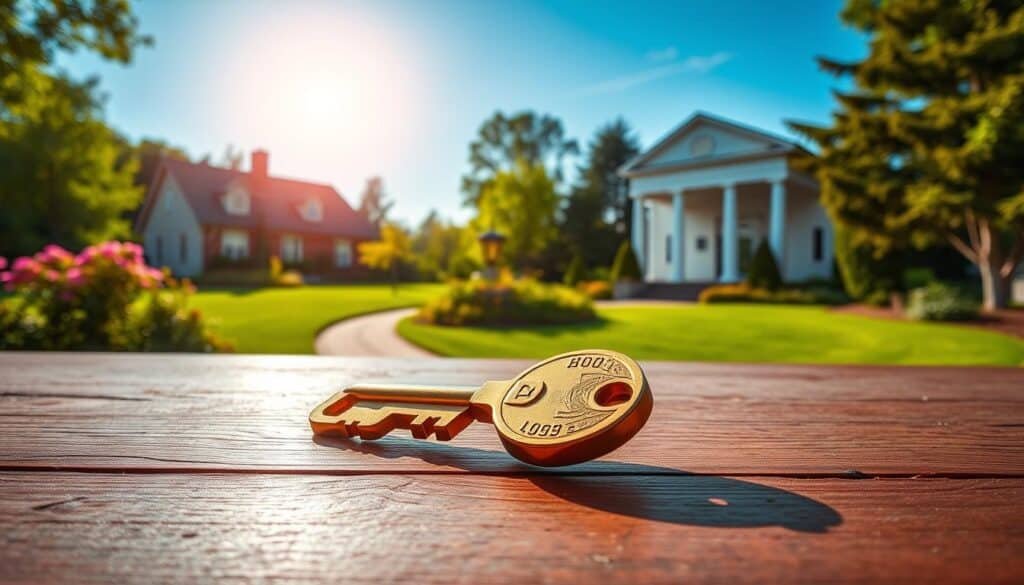Secured loans are a common choice for borrowing money. They are secured by something you own, like a house or car. This makes lenders feel safer, so they can offer better rates and bigger loans than unsecured loans.
One big plus of secured loans is the chance for a lower interest rate. Since the lender has something to fall back on, they can give you a better deal. This can save you a lot of money, especially for big purchases like a house or car.
Another advantage is that you can borrow more money. Secured loans let you borrow more than unsecured loans. This is great if you need a lot of money, like for a home or business.
Key Takeaways
- Secured loans offer lower interest rates and higher borrowing limits compared to unsecured loans.
- Collateral, such as a home or car, reduces the lender’s risk, resulting in more favorable terms for the borrower.
- Secured loans can be a valuable option for those seeking larger financing amounts or lower monthly payments.
- The risk of losing the collateral if the loan is defaulted is a key consideration for secured loan borrowers.
- Secured loans may come with additional requirements and restrictions, such as limitations on how the funds can be used.
Understanding Secured Loans and How They Work
Secured loans are a common way to borrow money. They use something of value, called collateral, to secure the loan. This can be a home, car, boat, stocks, bonds, or cash. By offering collateral, you can get more money and lower interest rates than with unsecured loans.
Types of Assets Used as Collateral
Secured loans can be backed by many assets. Here are some common ones:
- Real estate, such as a home or investment property (used for mortgages and home equity loans)
- Vehicles, like cars, trucks, or motorcycles (used for auto loans)
- Savings accounts, CDs, or other liquid assets (used for savings-secured loans)
- Stocks, bonds, or other investment accounts (used for securities-backed lines of credit)
- Business equipment, machinery, or inventory (used for commercial loans)
The Role of Liens in Secured Lending
When you get a secured loan, the lender puts a lien on your collateral. This lien lets the lender take the asset if you can’t pay back the loan. The lien makes the lender feel safer, so they can offer better loan terms to you.
Basic Mechanics of Secured Loans
The process for getting a secured loan varies. For example, getting a mortgage needs more paperwork than an auto loan. It’s important to think about the risks and benefits before getting a secured loan. Losing the collateral can be very costly.
Secured loans can be a good option if you have assets to use as collateral. Knowing about the different types of collateral, liens, and how secured loans work can help you decide if it’s right for you.
Key Benefits of Getting a Secured Loan

Secured loans have many good points for those looking to borrow money. One big plus is you can get larger loan amounts than with unsecured loans. This is because the loan is secured by something valuable like a house or car.
Also, interest rates on secured loans are usually lower than on unsecured ones. This makes borrowing cheaper. Plus, it’s easier to qualify for a secured loan, even if you have a lower credit score or less income.
Secured loans also offer the chance for tax deductions on interest payments. This is especially true for mortgages and home equity loans. It can lead to big savings, especially for those in higher tax brackets.
But, it’s important to think about the risks too. If you can’t pay back a secured loan, the lender might take your collateral. This could mean losing something valuable like a home or car. So, make sure you can pay back the loan and avoid losing your asset.
| Benefit | Description |
|---|---|
| Larger Loan Amounts | Secured loans allow borrowers to access larger sums of money due to the reduced risk for lenders. |
| Lower Interest Rates | Interest rates on secured loans are typically lower than unsecured options, making repayment more affordable. |
| Easier Qualification | Secured loans often have more relaxed qualification standards, making them accessible to those with lower credit scores or less income. |
| Tax Deductions | Certain secured loans, like mortgages and home equity loans, may offer tax deductions on interest payments. |
“Secured loans can be a game-changer for borrowers, providing access to larger amounts, lower rates, and potential tax advantages. However, the risk of losing collateral must be carefully considered.”
Popular Types of Secured Loan Options

Secured loans are a common choice for getting funds. They use collateral like a home, car, or savings. Mortgages, auto loans, and business loans are among the most popular.
Mortgages and Home Equity Loans
A mortgage uses the property as collateral. Homeowners can also get a home equity loan or a home equity line of credit (HELOC). These options let you use your home’s value for more funds, often at lower rates than unsecured loans.
Auto and Vehicle Loans
Buying a vehicle like a car, truck, or RV often means getting an auto loan. These loans usually have good interest rates. They’re a great choice for financing your transportation needs.
Business Secured Financing
Businesses can also get secured loans. Business loans can be backed by assets like inventory, equipment, or commercial real estate. This financing helps businesses grow and expand.
Each secured loan has its own terms and benefits. It’s important to think about your financial situation and goals. This will help you choose the right secured loan for you.
“Secured loans can be a useful tool for individuals and businesses looking to access financing, as they often come with lower interest rates and more favorable terms compared to unsecured loans.”
Interest Rates and Terms: What to Expect

Secured loans often have lower interest rates than unsecured loans. This is because the loan is backed by something valuable, like a house or car. The interest rates can be fixed or variable, lasting from one year to 30 years.
Also Read : How Do Interest Rates Impact The Loan Process?
The interest rate and repayment terms depend on your credit score, income, and the value of the collateral. It’s important to compare offers from different lenders. Use loan calculators to understand the total cost, including the annual percentage rate (APR).
Secured loans can help you get a lot of money, from $1,000 to $100,000. You’ll pay back the loan in fixed, monthly payments over two to seven years. But, missing a payment can hurt your credit score a lot, as the lender might take back the collateral.
FAQs
Q: What is a secured loan and how does it work?
A: A secured loan is a type of loan that is backed by collateral, which means the borrower offers an asset (like a car or property) to secure the loan. If the borrower defaults on the loan, the lender can take possession of the collateral to recover their losses. This typically allows borrowers to get lower interest rates compared to unsecured loans.
Q: What are the advantages of taking out a secured personal loan?
A: The advantages include lower interest rates, higher loan amounts, and the ability to qualify with bad credit. Secured personal loans can also help improve credit history if payments are made on time.
Q: How do secured loans differ from unsecured loans?
A: Secured loans require collateral, while unsecured loans do not. This means that secured loans often come with lower interest rates and are easier to qualify for, especially for individuals with bad credit.
Q: What types of collateral can be used for a secured loan?
A: Common types of collateral for a secured loan include cars, real estate, savings accounts, and other valuable assets. The type of collateral can affect the terms and rates of the loan.
Q: Can I get a secured loan with bad credit?
A: Yes, secured loans can be an option for individuals with bad credit, as the collateral reduces the lender’s risk. However, the terms and interest rates may still vary based on the lender’s policies.
Q: What happens if I default on a secured loan?
A: If you default on a secured loan, the lender has the right to take possession of the collateral used to secure the loan. This could mean losing your car, home, or other assets that were pledged as collateral.
Q: How can I apply for a secured loan?
A: To apply for a secured loan, you need to find a lender that offers secured loans, determine the type of collateral you can use, and provide necessary documentation such as income proof and credit history. You can then fill out an application to start the process.
Q: Are there any specific examples of secured loans?
A: Examples of secured loans include auto-secured loans, home equity loans, and title loans. Each type of secured loan uses different collateral and serves various purposes.
Q: What are some of the best secured personal loans available?
A: The best secured personal loans will vary based on individual circumstances, but they typically offer competitive interest rates, flexible terms, and reasonable fees. It’s advisable to compare offers from different lenders to find the best secured personal loans that suit your needs.
Source Links
- https://www.discover.com/personal-loans/resources/learn-about-personal-loans/secured-and-unsecured-loans/
- https://www.bankrate.com/loans/personal-loans/secured-vs-unsecured-personal-loans/
- https://abcfinance.co.uk/secured-loans/advantages-and-disadvantages-of-secured-loans/




